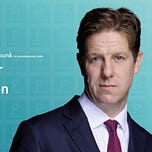Thanks for reading! The best way to make sure that you don’t miss any of these conversations is to subscribe to The Good Fight on your favorite podcast app.
If you are already a paying subscriber to this Substack or Persuasion, this will give you ad-free access to the full conversation with Fraser, plus the exciting bonus episodes we have in the works! If you aren’t, you can set up the free, limited version of the feed—or, better still, support the podcast by becoming a subscriber today!
Fraser Nelson is a British political journalist who was editor of The Spectator from 2009 to 2024. Nelson is also a columnist for The Times.
In this week’s conversation, Yascha Mounk and Fraser Nelson discuss social dysfunction in the UK; how and why Britain should pursue welfare reform; and Fraser's fight to keep the United Arab Emirates from purchasing British newspapers including The Spectator and The Telegraph.
This transcript has been condensed and lightly edited for clarity. This conversation was recorded on December 4th, 2024.
Yascha Mounk: It feels like British politics can't quite get out of a rut of turmoil and disappointment. Labour won a landslide victory in terms of its share of seats in parliament, though not in the popular vote. And now a few months into this Labour government, it seems to be extremely unpopular.
What's going on in British politics?
Fraser Nelson: I'm afraid to say it's a similar cycle that we see all over Europe. You get incumbent governments facing huge problems that they can't really solve, quite often involving demographic change, or the sheer size of government and the way that public services have got sort of clogged up. Then the opposition says, “OK, those guys have failed, vote for us and we'll change it.” And you get this anti-incumbent factor. So the voters will kick out the other guys, they'll accept the new guys at face value, but the new guys have dangled a lot more than they can deliver. They're facing exactly the same problems and this leads to disillusionment.
Now, the amazing thing that's happening in Britain is that this is happening so quickly: Keir Starmer hadn't been prime minister for a hundred days before he had lost popularity at a faster rate than any other prime minister in modern British history, with the exception of Liz Truss who was gone in just a few weeks. And that's because during the campaign he didn't really think much about what he would do, but in generalities. The election campaign was more of an anti-Tory vote than a pro-Labour vote so Labour wasn't properly scrutinized and when it gets into office, all of a sudden it turns out it doesn't have any ideas. So right now there are no fewer than 60 reviews that have been commissioned by the new government as it tries to find out how it's supposed to solve these problems. Now, traditionally this thinking is done in opposition, so when you get into government you have an agenda ready to go. These guys don't have an agenda ready to go. Meanwhile, things are getting worse and the disillusionment has happened very fast indeed.
The Conservatives are already slightly ahead in the opinion polls, but what's changed in Britain is that the right is now split between the Conservatives and Nigel Farage's Reform Party. So it could well be that the Reform are the real inheritors of Labour government's failures, and that we see the rise of—I don't know if you could quite call it “populism,” but so far Britain has been pretty much the only country in Europe not to have serious populist party in parliament or with any support in the opinion polls. I think Nigel Farage is going to challenge that status quo.
Mounk: Let's start with trying to explain why this fall from grace has been so fast. So the fact that governments come in with big promises, that they obviously end up not quite keeping those promises, and that over time people start to think “Let's give the other team a chance,” is a core mechanism of democracy. There's nothing surprising about that. But as you're saying, when Tony Blair came in in 1997, he was very popular for a good number of years. And it was really only the aftermath of the Iraq War that started to erode that. When David Cameron came in, he had a good number of years in which he was quite popular and he was re-elected rather convincingly at one point. So what's happening here? Is it just that something about the extent of disillusion with a political class has led to this process being supercharged?
Nelson: Well, when Tony Blair came in, he had a very clear agenda and he moved with almost biblical speed in the first seven days of the Labour government. They made the Bank of England independent, they created the minimum wage, they created the Department for International Aid. They had 18 years to think of what they would do and they used every single day to show that things were getting better, that the voters were getting the change that they had voted for. Now even David Cameron, was able to pass the Academies Act in 77 days. The complete overhaul of secondary education had been completed and welfare reform started very quickly after that. Of course, it wasn't very popular to start with, but if you plant the right seeds then they will bear fruit in four years’ time, just in time for a general election. That's how you handle a cycle. Keir Starmer has had absolutely none of this; he's come in with the largest majority ever seen in post-war politics but interestingly, if you look at his share of the vote, it's the smallest share of the votes ever held by a prime minister. So the public never quite turned towards him in the same way they had turned towards other prime ministers. So his majority is a little bit deceptive.
His mission was to try to win people over in government when he hadn't quite won them over in opposition. But then when he came in, he didn't really have that plan or anything like it. Instead, he decided to take the first budget to make some difficult tax-raising decisions. Now in a way that's quite standard for a new government—you get the unpopular stuff done first. The problem was that in the election campaign he had led people to believe he wouldn't raise taxes, so then he had to do this great performative gesture, “My god the public finances are worse than I thought, we're going to have to raise taxes.” And then when the Rachel Reeves budget came out there was very, very little to look forward to in that budget. Her plan was to take taxes to the highest they've been in our post-war history and the forecasts were that this wouldn't even improve economic growth. So it was more of a Churchill-style, having nothing to offer us but “blood, toil and tears.”
Now this was partly because Keir Starmer had to do two very big things. He had to de-Corbynize the Labour Party. It's easy to forget just what a complete wreck the Labour Party was after 2019. Nobody would have thought, looking at Jeremy Corbyn's second defeat, that Labour would have been in a position to win a huge majority in just five years. So Keir Starmer's main battle has been to win control of his own party, to get it back, and to get it electable. Now, he won that battle, as is evidenced by his election victory. But partly he won the battle by being vague about what he would do. He had the ability to keep it vague because the Tories were in such a mess. His strategy was to present as small a target as possible, but the price he paid for that successful electoral strategy was not really having a governing strategy. Now, the guy's got five years in power, and I think there's plenty time to find a governing strategy, and a successful one, but he doesn't have one right now and he is moving in an environment where voters are less patient than they used to be.
Mounk: I wonder whether there's a big difference between 1997 and today that people may have missed, and which may have led Starmer and his team to overestimate how much political capital they were going to have. In 1997, the incoming New Labour government represented a break with 18 years of Conservative Party rule and people had gotten sick of them, as they would of any party governing for that long. But there also was a genuine sense in which New Labour represented a cultural shift. There was the campaign ad “Things Can Only Get Better,” with this kind of bright multicultural London depicted. The sense that they represented what the modern country had actually become was very palpable. And I relate to that because having grown up in Germany where Helmut Kohl was chancellor for 16 years, until my 16th birthday, there was a kind of similar sense of a cultural shift. They were disappointed with a particular government, but there was also a sense the that government represents a kind of older culture that has passed its sell-by date. And I think this time around it's only the first of those two things.
You touched on the state of a Conservative Party, which after 14 years in power is and was desultory. And there was a real risk at one point during the election campaign that the Reform Party, led by Nigel Farage, might somehow supplant the Conservative Party. There was real fear that he might be able to do that, and though he had a significant share of the vote, that didn't materialize in terms of his share of parliamentary seats, which continues to be very, very low. At the same time, three or four or five years can be a long time in politics. And while people really were sick of the Conservative Party by the end of last government, after four or five years of Labour rule that may recede into the background. And the Conservatives now have a very interesting new leader in Kemi Badenoch, a young British Nigerian woman who takes, for good or ill, a very natural approach to cultural topics in a way that may be able to compete with Reform.
What do you think is the likelihood that Reform under Nigel Farage is really going to be able to supplant the Conservative party? Or, put inversely, do you think Kemi Badenoch is going to be able to renew the Conservative Party and stave off the challenge from Reform?
Nelson: I think there is a real chance that British politics might go the same way as Canadian politics. The Conservatives had this dreadful defeat, and there was a new party there, also called Reform, and they managed to say, “Look, this metropolitan elite is doing you wrong, and we want to come up with a new form of politics.” And then eventually they did sort of effectively merge with the Conservatives.
In the UK, we can certainly see the same sort of thing happening. In the last week, we've had sort of two significant defections from the Conservatives to Reform. We've had Andrea Jenkyns, who was a former Conservative MP, defeated at the last election, and now she's joined Reform. And then Tim Montgomerie, a commentator and founder of the ConservativeHome website. For years, he's been one of the best known Conservative commentators in Britain. Then he's come out and said, actually, I'm going to join Nigel Farage, and he's been photographed with Farage. So there is a sort of drum beat of ongoing defections. Now, you've also got a situation which I don't think any democracy has seen before, where Nigel Farage has got the pulpit of his own television show. He's presenting on GB News. And this is an incredibly powerful business. He's not relying on adverts in the middle of the news. He's not relying on questions he might be able to ask in parliament. He's been given an incredible platform in GB News to broadcast to potential voters with a channel which almost seems to be forged around his values, and that is going very well indeed. So the big test will come in the local government elections in May next year and the test will be whether Reform can get more councillors elected than the Conservatives. It sounds crazy given that only a few years ago Reform had almost no councillors. But now I think it is possible, not likely, but it is possible. So if we are going to see Reform gobbling up the Conservatives, then the local elections next year would be a landmark towards that.
Mounk: Let me broaden out a little bit to the state of Britain as a whole.
I think I've said this on the podcast before, but I always feel very torn when I try to think about how to assess Britain. First of all, obviously I have strong personal links to it; I went to university there and was really my first window into the world outside of Germany, where I grew up. And so I think it shaped me intellectually and culturally in many ways. Britain is in so many ways the most impressive country in Europe, from the fact that it has a UN Security Council seat, that it has nuclear weapons, that it has what are clearly the best universities in Europe, that it's the center of the financial industry in Europe; that London, perhaps with Paris as a kind of secondary rival, is really the only world city in Europe. There's so many strengths that Britain has. And at the same time, especially when you go back, and stray from the center of London, there's so many things about Britain that are really quite thoroughly crummy—from the housing that lot of people live in to the quite severe poverty in certain parts of the country, like Northeast London. And then, course, economically, the country is really stuck in a crisis that may be connected to Brexit, but probably started before that. I mean, it's a really striking fact that the GDP per capita of West Virginia, the poorest American state, is now higher than that of the United Kingdom. It's really striking that according to some projections—I'm not entirely sure that those will prove to be right—Poland will have a higher GDP per capita by the end of the decade than the United Kingdom.
Help us to make sense of this. Why is Britain in so many ways Europe's window to the world, and the most dynamic part of Europe, and then in so many other ways falling behind quite severely?
Nelson: There are, as you say, two Britains which you've clearly articulated there. The Britain was what I call the “New York Times Britain.” Ever since Brexit, Britain became the New York Times' kind of public enemy number one. I guess they saw in it a proto-Trumpian movement. And this became quite a problem for a British diplomat. So I remember I was once called into the Foreign Office as a journalist speaking to these ambassadors who were saying, “Help us try to fight against what the Financial Times, the Economist and the New York Times are all saying about Britain after Brexit, because they're just magnifying all of these things.” Let’s take, for example, what you mentioned, that on a GDP per capita basis Britain is now poorer than West Virginia and Mississippi—well, that was actually true 20 years ago. It's always been true. It's true for Sweden. It's just that right now these sort of comparisons capture the imagination a lot more because Britain has made the great folly of voting for Brexit and everything is now falling apart. Now, Britain does have a lot of problems, but I struggle to really trace very many of them to Brexit. It was said at the time that when Britain votes for Brexit, then it's going to be shutting its doors to the world. In fact, the exact opposite happened. So the number of immigrants in British workforce is now just almost 20%, which is higher than it is in the United States. Immigration after Brexit famously pretty much trebled. Now, that was because the new Tory government couldn't get the Brexit controls right. It wasn't exactly a policy. But I think it's difficult to say that Britain is insular, is populist, is turning us back on the world—I think all of these critiques don't really stand up to much scrutiny.
Now, let's look at as well as economic growth. It's certainly true that our GDP per capita is forecast to grow at just 1.3% over the next five years. But that would still make us the third fastest in the G7. You need to put Britain's woes in comparison to that of Germany, which is really not in a great place right now, with a huge projected decline in working age population. I mean, look at what's happening in France right now. The bonds are spiking. There's a political crisis. Compared to the rest of Europe, I think Britain is not in the worst place. We have got a whole bunch of problems, don't get me wrong on that. When you look at our GDP per capita projections, it's 1.2% over the next five years on average. Now, that's not great compared to America's 1.7%, but it's still the third best in the G7. You have to remember that Germany is in a pretty difficult situation. Also, when you look at the demographics, every country in Europe is projected to have a decline in the working-age population, with the exception of Britain. We've had pretty high immigration, but the side effect of that is that we're expected to have more working-age people. Most of Europe is bracing itself for less. So in the longer term, I think Britain is still one of the greatest countries in the world and we do have a whole bunch of problems, don't get me wrong, but I think they're all fixable. These demographic trends are a far bigger headache than a temporary kind of blip or sluggish GDP growth.
Mounk: I think Britain has some of the most dynamic environments in Europe. Again, it's one of a few real tech centers in Europe, for example. It has the best universities in Europe. It also, I think, for the less fortunate strata of its society, has some of greatest social dysfunction in Europe. When you go to a place in Britain that is deprived, it feels more deprived in some ways than the poorest places in Germany, Sweden or, for that matter, France. France obviously has banlieues that are struggling in various ways in the big cities. And I know you've just filmed a documentary about the British welfare system and some of the world of disadvantage and exclusion that interacts with and sets up.
So why is it that certain towns and certain social strata in Britain feel like they're so cut off from full participation in society and from the productive sectors of the economy?
Nelson: I think it's the most urgent social problem in Britain and I've tried to devote as much of my journalism over the years as I can to highlighting this problem. The last story I wrote for the Scotsman in Edinburgh where I was political editor was finding out that there was a place in Glasgow where the average male life expectancy was just 54—now, you will not find anywhere else in Europe where that is true. So the UK has managed to incubate some of the worst deprivation in the Western world. I'm Scottish, and if you look at Scotland's drug deaths, they are way, way bigger than any other developed country, by two or three times. So we seem to have a pattern of basically ignoring some of the worst social problems. Also, we've created the most expensive poverty, I think, in the world, because money is being poured into these areas, but not very well.
Mounk: As a brief side note, when Angus Deaton was on this podcast (he, course, has roots in Scotland and is now living in the United States) he highlighted that what he calls the “depths of despair” are very strong in the United States, particularly Appalachia and some of the poor regions of the Midwest and so on, but also Scotland.
Nelson: Yes, and if you look at what Professor Deaton has mentioned, his deaths of despair, liver disease, drug deaths, suicides of people in their kind of late 30s and 40s—those warning lights are blaring red in Scotland. I think that phrase of his—“deaths of despair”—is something that deserves a lot more attention. Now we now have the data to be able to highlight this a lot better. And in a documentary making the case about this for the UK, I've tried to highlight lots of areas which are kind of our equivalent to the banlieues except here we're looking at the working class British people who have been left behind by the rest of society and who don't feature in the debate as well. What I sought to do for my Channel 4 documentary was to find five or six of them and let them speak for themselves to show that this caricature that demonises them so much, that they are welfare scroungers, is not the case. They're good people caught in a bad system, but the system makes it very difficult for them to break out of this poverty.
Now, this actually comes back down to Brexit. You mentioned how you're opposed to it and by the way I can completely see why. I am a proud European, and I'm one of a minority of Brits who would describe myself as a European. My wife is a Swedish national and Brexit was a pain for me as well. I'm a cold warrior who really cherished the idea of this sort of union of peoples. But I had to accept that this model that worked for me as a globalist, as a university graduate, was not working for the people I've just been speaking about because it meant that the companies only have two options if they're running out of staff: Do you pay people more? Do you train them more? Or do you help yourself to this new brand of immigrants coming over from Poland, from Eastern Europe and now from other parts of the world, who are the best immigrants you could hope for? Incredibly well skilled, incredibly well trained, willing to start at the bottom. It's been a bit too much of a good thing.
You need to basically provide a better form of help. You need to look at things like family breakdown. You need to look at things interventions that will actually help people overcome addictions. And I think what really comes down to it is the nature of low-paid work. It's very hard for policymakers to fix. You can fix the welfare system, but it's harder to fix an economy where low-paid work, first of all, doesn't pay very much and also doesn't seem to offer the progression that it used to. Nowadays, the big companies don't really take people on the bottom of a big ladder; they will subcontract the work to an agency who will get you into doing these temporary jobs. And there's been an economic kind of disaggregation. And I think that's part of it as well.
So right now, a proper market economy should be able to spread opportunities. It should be able to take people at the bottom and to be able to let them by their own efforts climb to the top. That in Britain and the West isn't working as much and that makes the relative appeal of welfare greater, and it also makes us come apart a bit more as a society. In the U.S. there are far better studies on this than there are in the UK. But what I found when I was doing my documentary was that when you talk to these people who've been on welfare for years, there are all sorts of charities and groups willing to help them apply for welfare, but almost no help at all if they want to come off it and they want to come back into work. And they know, by the way, speaking to them, that they're going to be worse off, and they're going to get less money in work than they would do in welfare, but they want to do it for other reasons.
Now what kind of economic model have we created where the person who wants to do the right thing, he wants to go in and do the hard graft and the minimum wage, knows he's going to be worse off as result? The risk is that welfare can rob work of its economic function. It can rob the family, quite often, of its economic function. I mean, how many middle-class families would survive if the woman was guaranteed the man's income without the man's presence? These effects have gone unobserved because of a lack of interest. And I think this is the core problem, this simple lack of interest.
Would you (or someone you know) like to read my articles in German or French? Please subscribe to my sister Substacks!
Mounk: To close this part of the conversation, I'd love to challenge you to formulate your worldview as what I take to be—and correct me if you wouldn't describe yourself in these terms—a philosophically liberal conservative. I think it's clear that you have a commitment to a certain number of key philosophically liberal values, and I also assume that you also would call yourself a conservative. What do you think is the core worldview or the core set of insights or approaches that characterizes that political tradition?
Nelson: I would call myself a kind of old-fashioned Adam Smith liberal. I wouldn't call myself a conservative. My values are fundamentally liberal in the English sense of the word: I think societies are better and more cohesive when communities are empowered and the government is kept in a tight rein. It's funny that I'm quite often referred to as a conservative and I've stopped kind of resisting this. I was on the BBC recently talking about welfare and the conversation we've just been having, and the interviewer said, “But Fraser, we should pause here and let our viewers know that you're coming at this from a right-wing perspective.” Now, I didn't challenge it, but it struck me as a ridiculous thing to say.
Mounk: Well, it is ridiculous, because they would never say this to an average academic who would come on and speak, in most cases, from a left-wing perspective.
Nelson: I know, and those of us on my side of the debate are used to what we call the “health warning” when we go on to a discussion. It's as if everything you say gets discounted from the tribalist point of view. But even if you look at the way the word liberal is being used and distorted the world over, it's very difficult to actually come up with a word which describes your views, although my views have not changed very much over the years at all. The only thing that has changed is my view on immigration, because I think that the effect of mass immigration has been to undermine the nation state and the market economy model which as a liberal I believe in. But I'm a believer in immigration as well. If you look at the unemployment figures for immigrants versus natives in the UK, Britain has some of the best figures in the world. Compare that to Sweden, which has got one of the worst in the world and huge ghettoization, which we don't have to the same extent here.
And so, of course, despite believing this is success, I've now recently found myself at war, unintentionally, with others, my fellow liberals, who do believe in more unlimited immigration and who get very suspicious when people like me talk about the side effects of immigration. So you can see a kind of splintering amongst liberals now. So over the time I've found myself at loggerheads with almost everybody I used to agree with at some point, even though I don't think my views have changed very much.
Right now I think one of the things that we see is the rise of illiberal conservatism (and by the way, illiberalism on the left as well). But you can see this during lockdown, for example: There's a huge quasi-authoritarian mindset which kicked in during lockdown in a way which I think still deserves a lot more attention than it got. And I think that one of the overall problems is if you look at the rise of the precautionary principle, there is an ever-growing list of things that voters expect the government to protect them against. And as that list grows, the power of governments will grow, and the freedom that individuals are given shrinks. And I think that is one of the great challenges to show that the choice between liberty and security is no choice at all.
But increasingly, on right and left, you're seeing people who ask “Wouldn't it be better if there was a strong man coming along to sort everything out?” You can see the frustration there, especially in young voters. If governments everywhere seem to be unable to solve the problem because they get tied in knots, tied up in bureaucracy, held down with judicial reviews and the law courts—this, of course, makes the argument for Qatar, for the UAE, for Singapore, these kind of very successful illiberal countries that combine economic liberalism with political repression and seem to be doing very well compared to our democracies in Europe and in the U.S., where we seem to be getting stumped by the same problems. So I think this is a delicate moment for liberalism and I think that the battle for ideas needs to be joined and the defects of the illiberal promise need to be better exposed.
In the rest of this conversation, Yascha and Fraser discuss why dictators are trying to buy up Western media outlets, and how to stop them. This discussion is reserved for paying members…
Listen to this episode with a 7-day free trial
Subscribe to Yascha Mounk to listen to this post and get 7 days of free access to the full post archives.













